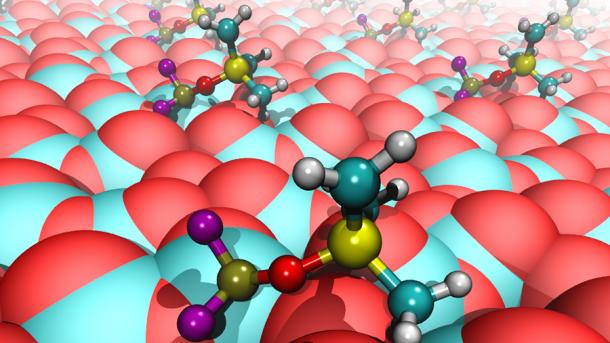Advanced Electrolyte Research
Our research emphasizes organic synthesis and material property, targeting the discovery of new organic materials to meet the challenges for next-generation electrochemical energy storage. Our strategy is to design and synthesize organic materials utilizing the group’s expertise in organic, organometallic and polymer chemistry with the aid of high-throughput quantum chemistry modeling.
Our research addresses key issues associated with a variety of energy storage chemistries, including lithium-ion, lithium-sulfur, lithium-air, magnesium-ion, sodium-ion, and non-aqueous/aqueous organic redox flow batteries.
Our group emphasizes organic synthesis and material electrochemical properties as a means to reveal the structure-property relationships in organic materials, allowing us to discover new materials with tailored functionalities and properties for energy storage applications. Our expertise encompasses various synthetic chemical disciplines, including organic, organometallic and polymer chemistry, in combination with electrochemistry and spectroscopy with the aid of high-throughput quantum chemistry modeling on a material’s basic structure and electronic properties. With these capabilities, we have the capability to design and create the next generation of materials to move the field forward.
Our group works on a portfolio of projects funded by the Department of Energy’s Office of Energy Efficiency and renewable Energy, Office of Basic Energy Sciences, and Advanced Research Projects Agency–Energy. Highlights of our group’s recent research activities include:
-
Expansion of the voltage window of electrolytes by introducing electron-withdrawing groups (F anions, fluorinated alkyl) onto the molecular skeleton of state-of-art solvents, the oxidation stability of the electrolyte can be enhanced at the charged surfaces of various commercially relevant cathodes such as LiNi0.5Mn1.5O4 (5V) spinel and nickel-rich layered cathode NMC materials at voltages > 4.5 V vs Li+/Li.
-
Creation of sparingly solvating electrolytes for lithium-sulfur batteries by studying the effect of the ether fluorination on solvation, viscosity and polysulfide (Li2Sx) dissolution.
-
Rational design of electrolyte additives to develop batteries with additional functionalities, including 1) redox shuttle additives that provide intrinsic overcharge protection for lithium-ion and sodium-ion batteries and 2) electrode passivation additives by sacrificial decomposition that provide kinetic stability at the electrode/electrolyte interfaces.
-
Development of redox-active organic molecules (ROMs) and polymers (RAPs) for non-aqueous/aqueous redox flow batteries. We systematically study the substitution effect of dimethoxybenzene- and TEMPO-based molecules and seek to understand the stability mechanism by using spectroscopy and electrochemical approaches. Furthermore, we design and develop novel ROMs with improved stability.
-
Development of magnesium-ion battery electrolytes based on magnesium hexamethyldisilazide (Mg(HMDS)2) and magnesium chloride (MgCl2), which enable reversible Mg deposition/dissolution with a coulombic efficiency > 99%. Study the effect of MgCl2 on the enhancement of Mg deposition in magnesium phenoxides and Grignard reagents.

